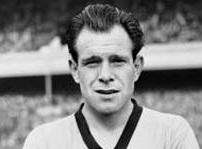|
|
|
Norman
Deeley |
Wolverhampton Wanderers
FC
2 appearances, 0 goals
P 2 W 0 D 0 L 2 F 1:
A 6
0% successful
1958-59
captain: none
minutes played: 180 |
|
 |
|
Timeline |
| |
Norman Victor Deeley |
|
Birth |
30 November 1933 in
Wednesbury, Staffordshire [registered in
Wednesbury, March 1934] |
|
Marriage |
to Dorothy M. Morris [registered in
Bilston, March 1956] |
|
Death |
7 September 2007, in Wednesbury, aged
73 years 281 days. |
|
Source |
Douglas Lammings' An
English Football Internationalist Who's Who [1990] &
 |
|
Club Career |
|
Club(s) |
Played schoolboy football for South-East Staffordshire, and joined
Wolverhampton Wanderers FC as an amateur in 1948, turning professional in
November 1950. He remained for over eleven years,
making 206 league appearances and scoring 66
goals, joining Leyton Orient FC in February 1962 for £13,000
and made another 73 league appearances, scoring
nine goals. Joined Worcester City FC in July 1964 and onto
Bromsgrove Rovers FC in 1967. Joined Darlaston in August 1971. |
|
Club honours |
Football League Champions 1957-58, 1958-59;
FA Cup winners 1959-60; |
|
Individual honours |
None |
|
Distinctions |
There are playing fields in Wednesbury named in his honour. |
|
Height/Weight |
5'
4¾", 10st.
3lbs [1959]. |
|
Source |
Douglas Lammings' An English
Football Internationalist Who's Who [1990]. |
|
England Career |
|
Player number |
One of two who became the 778th players
(779) to appear for England. |
|
Position(s) |
Outside-right |
|
First match |
No. 331, 13 May 1959, Brazil 2
England 0, an end-of-season tour match at Estádio Jornalista Mário Filho,
Maracanã, Rio de Janeiro, aged 25 years
164 days. |
|
Last match |
No. 332, 17 May 1959,
Peru
4 England 1,
an end-of-season tour match at
Estadio Nacional, Lima, aged
25 years 168 days. |
|
Major tournaments |
World Cup Finals 1958 (provisional); |
|
Team honours |
None |
|
Individual honours |
England Schoolboy (one appearance, 1948) |
|
Distinctions |
None |
|
Beyond England |
|
No additional information, although
he did manage a community centre in Walsall. -
An English Football Internationalists' Who's Who.
Douglas Lamming (1990). Hatton Press, p.86. |
|
The Numbers |
|
parties |
Appearances |
reserve |
minutes |
 |
captain |
| 3 |
2 |
two |
180 |
0 |
none |
|
minutes are an approximation, due to the fact that many matches rarely stick to exactly ninety minutes long, allowing time for injuries and errors. |
|
P |
W |
D |
L |
F |
A |
GD |
FTS
|
CS |
FAv |
AAv |
Pts% |
W/L |
|
2 |
0 |
0 |
2 |
1 |
6 |
-5 |
1 |
0 |
3 |
2.5 |
0 |
-2 |
|
All matches were friendly matches and played in a white shirt |
Shirt Record
|
Colour |
P |
W |
D |
L |
F |
A |
GD |
FTS
|
CS |
FAv |
AAv |
Pts% |
W/L |
|
White |
1 |
0 |
0 |
1 |
0 |
2 |
-2 |
1 |
0 |
0.00 |
2.00 |
0.00 |
-1 |
|
Blue |
1 |
0 |
0 |
1 |
1 |
4 |
-3 |
0 |
0 |
1.00 |
4.00 |
0.00 |
-1 |
Match History
|
Club: Wolverhampton
Wanderers F.C. - two full appearances
(180 min) |
manager: Walter Winterbottom -
two full appearances (180 min)x
|
|
apps |
match |
pic |
match details |
comp |
res. |
rundown |
shirt |
|
England's selectors announced their forty-man squad from whom the final
22 would be selected, on April 22 1958.
Of the 18 players who were cut from the squad on 28 May, they included
Norman Deeley. |
|
|